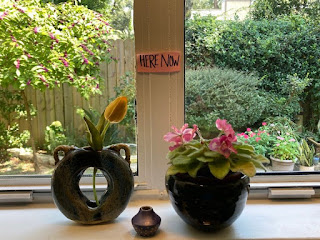Even as a boy growing up in Chicago, Radhanath Swami (born Richard Slavin in 1950) is different from others. Shy, reserved, and unusually compassionate, he seems out of sync in his surroundings, but fully aware of his need to find his true self, his calling in life. He embraces the counterculture of the seventies and ends up traveling, at 19, to Europe and to India. He openly shares, in vivid detail, the memories of his life. It's clear from the beginning that he will stop at nothing to reach his goal. And when he becomes a renowned spiritual guide, he returns to us with this powerful story and its simple message: stay in contact with your creator.
I still can't quite believe he sits on a rock in the Ganges River every day for a month in solitary meditation, but he has a picture of it. He lives in Himalayan caves, eats only what is offered to him as a mendicant, and travels any way he can to meet great Indian saints, gurus, and yogis who inspire him. He writes heartbreaking letters to his family back home and, as the reader, you see his struggle--and imagine theirs.
Radhanath Swami is an incredibly brave man, and driven by the need to find his truth. He says, "I tend to compartmentalize my thoughts, saying, 'Now I'll think about the political situation. Now I'll feel appreciation for this wonderful life. Now I'll think about food.' But what if my appreciation, my love for a divine being, can float above the compartments?"
Twice he quotes the beautiful guru and Indian saint Anandamayi Ma: "All sorrow comes from the sense of I and mine. All sorrow is due to one's keeping apart from God. When you are with Him all pain disappears. There can be no security, no stability here. These are to be found in God alone. Whenever you possibly can, sustain the flow of the sacred Name. To repeat His Name is to be in His presence. If you associate with the Supreme Friend, He will reveal His true being to you." She also says, "When your mind becomes vacant, endeavor to fill it with the awareness of God and His contemplation."
Guru Babaji Maharaja says, "Love of God is the inherent nature of the soul and is dormant within everyone. Chanting God's name reawakens that love from within the heart. We should aspire to be the humble servants of the servant of the servant of the Lord." And, "Just serve every creature in God's creation with humility, respect, and love. Just sing the names of Rama and everything else will be attained."
He also meets Mother Teresa, who is cleaning a cooking pot at the time. When someone asks why she is doing this, she says, "Serving God and humanity is an honor, not a chore. Any type of service to God is a blessing. There is no high or low." When asked where she finds the strength, she answers, "All my strength comes from the Lord's Holy Names."
I'm the cleaner of cooking pots in my home (and grateful that Chris likes to cook!) so I've posted a little reminder over my sink. "Here Now" it says. I learned (on Tiktok, I'll admit) that a profound way to become aware of the present and to think of my Higher Power is to narrate what I'm doing, especially as I clean the dishes. Somehow, saying to myself, "Rinsing the coffee cup, watching a cardinal, pumping soap into my hands," brings me into the moment. It's an easy step from there to taking a deep breath and feeling the presence of my Higher Power.
I'll leave you with one last quote from Swami sitting on his rock in the Ganges with the hope that you'll consider delving into the book yourself. "Except for the birdsong, that evening the Ganges valley was still with an almost mythical silence. My mind floated, recalling how God had taken from me so little and given me so much. For a moment I contemplated that to the degree one feels unworthy of grace, one will be grateful when it comes. It is gratitude that makes the heart receptive to receive the Lord's blessings. Closing my eyes, I merged again in the endless chant of Om, the river's song. It was just so beautiful."

